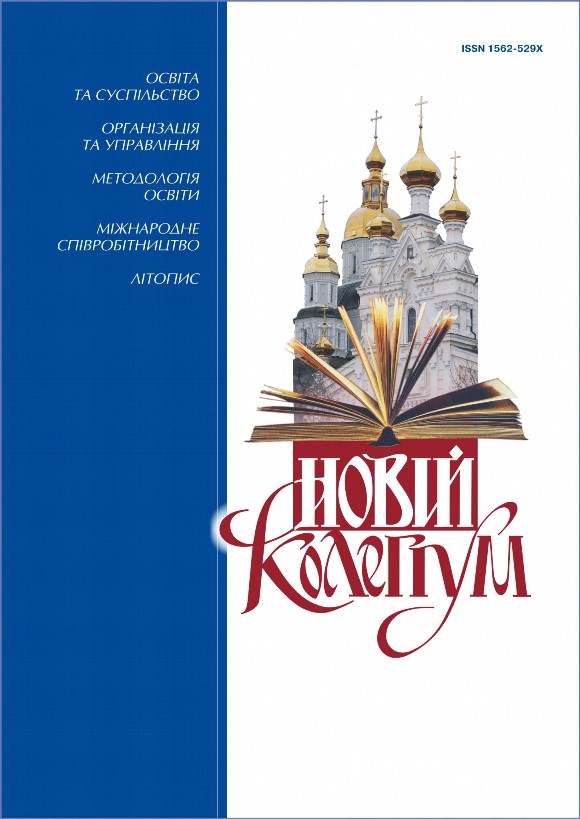Transformation of the classical educational process: effective strategies and tools for conducting distance lessons
DOI:
https://doi.org/10.30837/nc.2023.4.60Keywords:
transformation, distance learning, digital space, progress, means, tools, artificial intelligenceAbstract
The article is devoted to the problem of transformation of the classical educational process, namely: the use of new digital spaces, effective distance learning strategies, new formats in education, the development of digital modernization, progress in modern education and technologies. Also, the expression of available digital results in the information environment and the use of the necessary means and tools for distance learning.
The article also reveals the problem of using artificial intelligence as an assistant in the online format, which demonstrates the transformation of the traditional model of education. Addressing the problem of the effectiveness of strategies during distance lessons is important for revealing the main forms of online communication and various web resources.
The transformation of the classical educational process helps to improve the digital skills of both the teacher and the student. Thanks to the raised problem, the reader has the opportunity to get acquainted with the concept of "artificial intelligence", its possibilities to work in the educational field; analyze in detail what tools can be used during distance learning and, of course, find out what additional assistants (created on the basis of AI) can be useful during the online format.
The article examines the aspect of online communication, which helps the teacher to find the right approach to the student during learning, and the student to gain knowledge effectively. The distance format gives the student the opportunity to work with various applications in practice, to try to get an education "in a non-classical way" and to start mastering technologies from an early age. Undoubtedly, the topic discussed will help students, scientific and pedagogical workers when writing scientific papers.
References
Візнюк І. М., Буглай Н. М., Куцак Л. В., Поліщук А. С., Киливник В. В. Використання штучного інтелекту в освіті // Сучасні інформаційні технології та інноваційні методики навчання у підготовці фахівців: методологія, теорія, досвід, проблеми. 2021. № 59. С. 14–22.
Virtual Assistant DataBot: Artificial Intelligence // DataBot. URL: https://www.databot-app.com/ (date of access: 08.07.2023).
Гутьєррес Д. 6 найкращих програм зі штучним інтелектом. URL: https://androidayuda.com/uk/застосування/рекомендується/6-найкращих-програм-зі-штучним-інтелектом/ (дата звернення: 08.07.2023).
V. Antonyuk, Y. Drachuk, M. Yavorska, O. Stalinska, A. Zerkal. The 4 th International scientific and practical conference – Modern research in world science (July 10-12, 2022) SPC – Sci-conf.com.ua, Lviv, Ukraine. 2022. P. 870–877.
Куц М. ChatGPT і не тільки: 20+ корисних сервісів на основі штучного інтелекту // Освіта нова. URL: https://osvitanova.com.ua/posts/5893-chatgpt-i-ne-tilky-20-korysnykh-servisiv-na-osnovi-shtuchnoho-intelektu (дата звернення: 07.07.2023).
Лотоцька А., Пасічнік О. Організація дистанційного навчання в школі : метод. рек. Київ, 2020. 71 с.
Mazurek G. Transformacja cyfrowa – perspektywa instytucji szkolnictwa wyższego. Transformacja Akademickiego Szkolnictwa Wyższego w Polsce w okresie 30-lecia 1989–2019. 2019. N. 7. P. 313–332.
Мар’єнко М., Коваленко В. Штучний інтелект та відкрита наука в освіті // Фізико-математична освіта. 2023. Т. 38, № 1. С. 48–53.
Міністерство освіти і науки України. Міністр освіти і науки України презентував програму великої трансформації «Освіта 4.0: український світанок» / Міністерство освіти і науки України. URL: https://mon.gov.ua/ua/news/ministr-osviti-i-nauki-ukrayini-prezentuvav-programu-velikoyi-transformaciyi-osvita-40-ukrayinskij-svitanok (дата звернення: 03.07.2023).
Міністерство освіти і науки України. Цифрова трансформація освіти і науки / Міністерство освіти і науки України. URL: https://mon.gov.ua/ua/tag/cifrova-transformaciya-osviti-ta-nauki (дата звернення: 01.07.2023).
Мірошнікова А. На українські школи очікує велика трансформація // Освіторія. URL: https://osvitoria.media/experience/na-ukrayinski-shkoly-ochikuye-velyka-transformatsiya/ (дата звернення: 06.07.2023).
Найшвидший, найрозумніший, найсучасніший голосовий помічник // SoundHound.URL: https://www.soundhound.com/soundhound-chat-ai/ (дата звернення: 10.07.2023).
Регіональна цифрова трансформація // Дія. Освіта. URL: https://osvita.diia.gov.ua/courses/regional-digital-transformation (дата звернення: 05.07.2023).
Пінчук О. Аналітичний ретроспективний огляд використання електронних соціальних мереж у навчанні // Цифрова трансформація відкритих освітніх середовищ: кол. монографія, 2019. С. 69–74.
Собченко Т. Використання цифрових сервісів та інструментів у процесі професійної підготовки майбутніх учителів музичного мистецтва // Наук. журн. Хортицької нац. академії. 2022. № 2. С. 93–100. DOI: https://doi.org/10.51706/2707-3076-2022-7-10
Собченко Т., Федоренко В. Використання інтерактивних технологій в освітньому процесі: переваги та недоліки // Матеріали VІІ Міжнар. наук.-практ. конф. Психолого-педагогічні проблеми вищої і середньої освіти в умовах сучасних викликів: теорія і практика : (Харків, 16 – 18 березня 2023 р.) / Харк. нац. пед. ун-т імені Г. С. Сковороди. С. 581–583.
Штучний Інтелект в освітньому процесі // Українська школа майбутнього. URL: https://www.futureschool.online/post/artificial_intelligence/ (дата звернення: 04.07.2023).
Що таке Google Assistant? // Google Assistant. URL: https://assistant.google.com/ (дата звернення: 07.07.2023).

